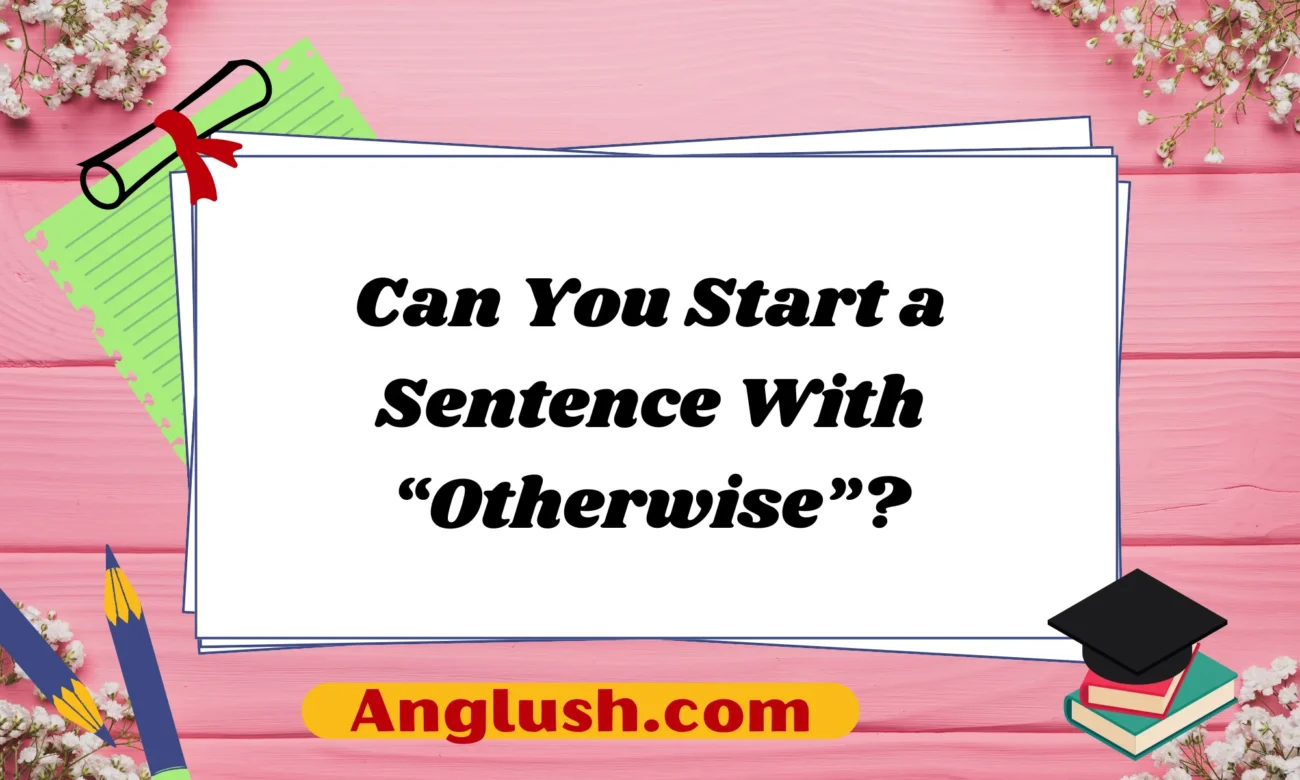Introduction
The English language is full of words that can be used in flexible ways, and “otherwise” is no exception. Many people wonder if it is grammatically correct to start a sentence with “otherwise.” The short answer is yes, you can. However, understanding when and how to use “otherwise” correctly can enhance your writing and speaking skills.
In this article, we will explore the different uses of “otherwise,” examine its role in different contexts, and provide alternative words and phrases for variety. We will also include texting examples to demonstrate practical usage.
The Meaning and Uses of “Otherwise”
“Otherwise” is a versatile word with several meanings. It can function as an adverb or a conjunction, depending on the context. Here are the primary meanings:
- In a different way or manner
- Example: I thought the meeting would be boring, but it turned out otherwise.
- If not, or else
- Example: We need to leave now; otherwise, we’ll miss the train.
- Apart from that, or in other respects
- Example: The report was well-written; otherwise, there were no major issues.
Can You Start a Sentence With “Otherwise”?
Yes, you can start a sentence with “otherwise,” but it is important to use it correctly to maintain clarity and coherence. Here’s how:
- To Show an Alternative Perspective
- Example: The project was expected to fail. Otherwise, the company would not have allocated extra resources.
- To Indicate a Consequence
- Example: You should submit the form today. Otherwise, your application will be rejected.
- To Contrast a Statement
- Example: The cake was slightly burnt. Otherwise, it was delicious.
Starting a sentence with “otherwise” is grammatically correct, but it works best in contexts where it clearly connects to the previous statement.
When to Avoid Starting a Sentence With “Otherwise”
While “otherwise” can start a sentence, there are some cases where it might not be the best choice:
- Lack of Context: If the sentence before does not establish a clear contrast or condition, using “otherwise” can confuse the reader.
- Overuse in Formal Writing: In professional or academic writing, excessive use of “otherwise” at the beginning of sentences can make the text feel repetitive or informal.
- Misuse as a Standalone Thought: “Otherwise” typically needs a preceding idea to contrast against.
Alternatives to “Otherwise”
If you want to avoid starting a sentence with “otherwise,” here are some alternatives based on context:
1. To Show an Alternative Perspective
- Instead
- Example: The project was expected to fail. Instead, the company allocated extra resources.
- On the other hand
- Example: The decision seemed logical. On the other hand, some experts disagreed.
2. To Indicate a Consequence
- If not
- Example: You should submit the form today. If not, your application will be rejected.
- Or else
- Example: Follow the instructions carefully, or else you may damage the device.
3. To Contrast a Statement
- However
- Example: The cake was slightly burnt. However, it was delicious.
- That being said
- Example: The job is demanding. That being said, it is also very rewarding.
Using “Otherwise” in Texting and Casual Conversations
Texting and casual conversations often require brevity and clarity. Here are some examples of how “otherwise” can be used in everyday text messages:
Texting Examples
- “Hurry up! Otherwise, we’ll be late for the movie!”
- “You should rest. Otherwise, you’ll feel worse tomorrow.”
- “The restaurant is fully booked. Otherwise, we could have dined there.”
- “I’d help you move, but I’m working today. Otherwise, I’d be there!”
- “Finish your homework now. Otherwise, you won’t have time to play later.”
- “The concert was expensive. Otherwise, I would have gone.”
- “We need to leave by 6 PM. Otherwise, traffic will be terrible.”
- “You must wear a coat. Otherwise, you’ll catch a cold.”
- “It’s raining heavily. Otherwise, we could have gone for a walk.”
- “She had to cancel her trip. Otherwise, she would have joined us.”
These examples show how “otherwise” naturally fits into casual conversations, providing clarity and flow.
Conclusion
Starting a sentence with “otherwise” is not only grammatically correct but also a useful way to create contrast, express consequences, and offer alternative perspectives. However, it is essential to use it appropriately, ensuring it connects logically to the preceding statement.
If you feel that “otherwise” is too repetitive or does not fit the tone of your writing, there are many alternative words and phrases you can use instead.
By understanding the proper usage of “otherwise,” you can enhance your communication skills and make your writing clearer and more effective.

